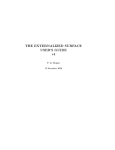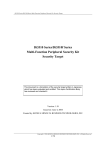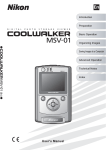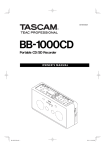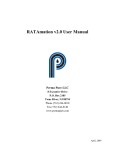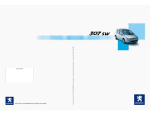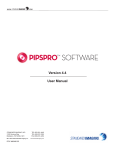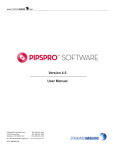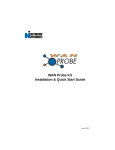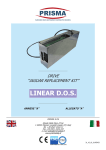Download Security Target - Common Criteria
Transcript
KYOCERA MITA Data Security Kit (B), Security Target
KYOCERA MITA
Data Security Kit (B),
Overseas Security Target,
Version 0.15
This document is a translation of the security target written in Japanese,
which has been evaluated and certified. The Japan Certification Body has
reviewed and checked it.
October 21, 2005
KYOCERA MITA Corporation
KYOCERA MITA Corporation
KYOCERA MITA Data Security Kit (B), Security Target
- Revision History Date
Version
Apr. 26, 2004
0.01
Jun. 23, 2004
Aug. 6, 2004
Content of revision
Approved
Drafter
• Newly drafted
Yoshioka
Sone
0.02
• Modifications of expressions and descriptions in general
Yoshioka
Sone
0.03
• Modification of the items pointed-out in chapters one to
Yoshioka
Sone
Yoshioka
Sone
Yoshioka
Sone
Yoshioka
Sone
Yoshioka
Sone
three
Sep. 14, 2004
0.04
• Modification of TOE identification
• Modification of the items pointed-out in chapters one to
eight
Sep. 17, 2004
0.05
• Modification of TOE constitution
• Modification of the version of TOE identification
Oct. 21, 2004
0.06
• Support of ASE001-01, ASE002-01, ASE003-01,
ASE004-01, and ASE005-01
Nov. 17, 2004
0.07
• Support of ASE006-01, ASE007-01, ASE008-01,
ASE009-01, ASE010-01
Nov. 26, 2004
0.08
• Support of ASE011-01, ASE012-01, and ASE013-01
Yoshioka
Sone
Jan. 8, 2005
0.09
• Support of ASE014-01
Yoshioka
Sone
Jan. 19, 2005
0.10
• Changed the name of the Assurance requirements
Yoshioka
Sone
Yoshioka
Sone
Yoshioka
Sone
Yoshioka
Sone
Yoshioka
Sone
Yoshioka
Sone
document
Apr. 6, 2005
0.11
• Support of ASE015-01
• Changed the name of the assurance requirement
document
Apr. 26, 2005
0.12
• Changed "Person in charge of maintenance" to "Person
in charge of service"
Jun. 14, 2005
0.13
• Modified the descriptions related to O.METHOD
• Modified the name for Table 6.2
Aug. 4, 2005
0.14
• Partial modification of the descriptions of Table 6.2
• Partial modification of the documentations for assurance
measures
Oct. 21, 2005
0.15
• Added the descriptions related to OE.POWER
KYOCERA MITA Corporation
KYOCERA MITA Data Security Kit (B), Security Target
- Table of contents 1. ST Introduction .................................................. 1
1.1. ST Identification...................................................................................................... 1
1.1.1. ST Identification ............................................................................................... 1
1.1.2. TOE Identification............................................................................................. 1
1.1.3. Used CC Version .............................................................................................. 1
1.2. ST Overview ............................................................................................................ 1
1.3. CC Conformance .................................................................................................... 2
1.4. Reference Materials................................................................................................ 2
2. TOE Description................................................. 3
2.1. TOE Type ................................................................................................................. 3
2.2. Terminology ............................................................................................................ 3
2.3. TOE Overview ......................................................................................................... 5
2.3.1. The purpose of utilizing the TOE .................................................................... 5
2.3.2. The environment in which the MFPs are utilized........................................... 5
2.3.3. People associated with the TOE ..................................................................... 6
2.4. TOE Configuration.................................................................................................. 7
2.4.1. Physical Configuration of the TOE ................................................................. 7
2.4.2. Operating environment of the TOE ................................................................. 8
2.4.3. Software that constitute the TOE .................................................................... 9
2.4.4. Logical Configuration of the TOE ................................................................. 10
2.5. TOE functions ....................................................................................................... 12
2.5.1. TOE Security Functions................................................................................. 12
2.5.2. Ordinary functions ......................................................................................... 13
2.6. Assets to be protected......................................................................................... 17
3. TOE Security Environment ............................. 19
3.1. Assumptions......................................................................................................... 19
3.2. Threats .................................................................................................................. 19
3.3. Organizational Security Policies ......................................................................... 19
4. Security Objectives ......................................... 20
4.1. Security Objectives of the TOE ........................................................................... 20
KYOCERA MITA Corporation
KYOCERA MITA Data Security Kit (B), Security Target
4.2. Security Objectives for the Environment ........................................................... 20
5. IT Security Requirements ............................... 21
5.1. TOE Security Requirements ................................................................................ 21
5.1.1. TOE Security Functional Requirements ....................................................... 21
5.1.2. TOE Security Assurance Requirements....................................................... 32
5.2. Security Requirements for the IT Environment ................................................. 33
5.3. Minimum Strength of Function............................................................................ 33
6. TOE Summary Specifications......................... 34
6.1. TOE Security Functions ....................................................................................... 34
6.1.1. HDD Overwrite Funciton ................................................................................ 34
6.1.2. Administrator authenticating function ......................................................... 37
6.2. Security Mechanisms........................................................................................... 38
6.3. Security Strength of Function ............................................................................. 39
6.4. Assurance Measures............................................................................................ 39
7. PP Claims ......................................................... 42
8. Rationale........................................................... 43
8.1. Security Objectives Rationale ............................................................................. 43
8.1.1. Compatibility of Security Objectives for Threats and Organization Security
Policies............................................................................................................ 43
8.1.2. Compatibility of the "security objectives for the environment" to the
assumptions ................................................................................................... 44
8.2. Security Requirements Rationale ....................................................................... 46
8.2.1. Compatibility of Security Function Requirements for Security Objectives
46
8.2.2. Rationale for TOE security functional requirement dependencies ............ 47
8.2.3. Mutual Effect of TOE Security Functional Requirements ........................... 48
8.2.4. Rationale for the level of the minimum strength of function for security
objectives........................................................................................................ 50
8.2.5. Rationale for Assurance Requirements ....................................................... 50
8.3. TOE Summary Specification Rationale .............................................................. 51
8.3.1. Conformity of Security Functional Requirements for TOE Summary
Specifications ................................................................................................. 51
KYOCERA MITA Corporation
KYOCERA MITA Data Security Kit (B), Security Target
8.3.2. Rationale for Security Functions Strength................................................... 54
8.3.3. Rationale for Assurance Measures............................................................... 54
8.4. PP Claims Rationale............................................................................................. 57
KYOCERA MITA Corporation
KYOCERA MITA Data Security Kit (B), Security Target
- Table of contents of drawings –
Fig. 2-1
A common usage in offices ............................................................................ 5
Fig. 2-2
Construction diagram of TOE......................................................................... 8
Fig. 2-3
Logic diagram of the TOE ............................................................................. 11
KYOCERA MITA Corporation
KYOCERA MITA Data Security Kit (B), Security Target
- Table of contents of tables Table 2-1
Definitions of terms related to TOE............................................................. 3
Table 2-2
Specifications for the hardware, network hardware, and HDDs ............... 9
Table 2-3
Software that constitute the TOE ................................................................ 9
Table 2-4
The TOE functions, places of storage, and the deleting means ............. 16
Table 5-1
Control Item List ......................................................................................... 29
Table 5-2
TOE Security Assurance Requirements.................................................... 32
Table 6-1
TOE Summary Specifications and Security Function Requirements..... 34
Table 6-2
Assurance Measures .................................................................................. 39
Table 8-1
The correspondence of threats and organization security policies, to the
security objectives ...................................................................................... 43
Table 8-2
Assumptions and Security Objectives for the Environment Support .... 44
Table 8-3
Security Objectives and TOE Security Function Requirements Support
...................................................................................................................... 46
Table 8-4
Dependent Relationships Between TOE Security Function Requirements
...................................................................................................................... 47
Table 8-5
Table 8-6
Mutual effect of security requirements ..................................................... 49
TOE Summary Specifications and Security Function Requirements
Support ........................................................................................................ 51
KYOCERA MITA Corporation
KYOCERA MITA Data Security Kit (B), Security Target
1. ST Introduction
1.1. ST Identification
1.1.1. ST Identification
Name:
KYOCERA MITA Data Security Kit (B) Overseas Security Target
Version:
Version 0.15
Creation Date:
October 21,2005
Producer:
KYOCERA MITA Corporation
1.1.2. TOE Identification
Name:
Data Security Kit (B) Software
Version:
V1.10E
Developper:
KYOCERA MITA Corporation
Note: Version 1.10E is constituted by the following ROM versions.
MAIN
: 29101B-0210.00
PRINTER
: 2FB_3F00.001.200
1.1.3. Used CC Version
ISO/IEC 15408:1999
Common Criteria CCIMB Interpretations(as of 15 February 2002)
Note: The Japanese versions are used as for the following materials.
•
Common Criteria for Information Technology Security Evaluation Part 1: Overview and
General Model, version 2.1, August 1999, CCIMB-99-031 (Japanese)
•
Common Criteria for Information Technology Security Evaluation Part 2: Security
Structure Requirements, version 2.1, August 1999, CCIMB-99-032 (Japanese)
•
Common Criteria for Information Technology Security Evaluation Part 3: Security
Assurance Requirements, version 2.1, August 1999, CCIMB-99-033 (Japanese)
•
Common Criteria CCIMB Interpretations(as of 15 February 2002)
1.2. ST Overview
This ST describes the "Data Security Kit (B) Software" to be installed on the Multifunctional
products (MFPs), the overseas versions of the "KM-8030 / KM-6030, CS-8030 / CS-6030,"
provided by KYOCERA MITA Corporation. MFPs are products that have printer functions
and network scanner functions, besides the copying functions as a copier. (The copier, printer,
and network scanner functions will be called ordinary functions, hereafter.)
By using the
MFPs, the users will be able to handle not only the outputted paper documents, but will also
KYOCERA MITA Corporation
KYOCERA MITA Data Security Kit (B), Security Target
be able to treat them as electronized documents.
This TOE is a software module that is installed on the MFPs "KM-8030/KM-6030,
CS-8030/CS-6030" as options, and which provides the ordinary functions, and also security
functions for protecting residue data.
Security Functions to be provided by the TOE:
•
A function to protect residue data after the processings of copying, printing, or network
scanning, and also after logical deletions of data stored within the MFP.
1.3. CC Conformance
For security function requirements
Part 2 conformant
For security assurance requirements
Part 3 conformant
Evaluation assurance level
EAL 3 conformant
1.4. Reference Materials
•
Common Criteria for Information Technology Security Evaluation
Part 1: Introduction and general model
August 1999 Version 2.1 CCIMB-99-031
•
Common Criteria for Information Technology Security Evaluation
Part 2: Security functional requirements
August 1999 Version 2.1 CCIMB-99-032
•
Common Criteria for Information Technology Security Evaluation
Part 3: Security assurance requirements
August 1999 Version 2.1 CCIMB-99-033
•
Common Criteria CCIMB Interpretations(as of 15 February 2002)
•
ISO/IEC 15408, Information Technology – Security techniques – Evaluation criteria for
IT security – Part1, 99/12
•
ISO/IEC 15408, Information Technology – Security techniques – Evaluation criteria for
IT security – Part2, 99/12
•
ISO/IEC 15408, Information Technology – Security techniques – Evaluation criteria for
IT security – Part3, 99/12
KYOCERA MITA Corporation
KYOCERA MITA Data Security Kit (B), Security Target
2. TOE Description
2.1. TOE Type
This TOE is a software module product called "Data Security Kit (B) Software," and it
provides security functions to the MFPs.
Note: Software modules providing ordinary functions are also included within the scope of the
TOE.
2.2. Terminology
The definitions for the terms used in this ST are indicated in Table 2-1.
Table 2-1
Definitions of terms related to TOE
Terms
Spool-storage
Definitions
Keeping the received image data temporarily on the HDD, without
outputting it or forwarding it as is. This is executed automatically during
the process of the MFP, without the user being conscious about it. This
should be compared to long period storage.
Long period storage
Keeping the received image data on the HDD for a long period. The users
will have to consciously conduct the storage or reading operations for this
storage. This should be compared to spool-storage.
Client PC
It indicates the computers that connect to the network, and utilize the TOE
services (functions) of the TOEs that are connected to the network.
Network scanner
A function to transmit the scanned originals as image data, to the client
PCs. There is PC transmission that transmits them via the LAN, e-mail
transmission that transmits them via e-mails, and a TWAIN function that
captures images of the originals by operations from the client PC.
PC transmission
This is a processing in which the scanned images are compressed into file
formats specified by the user, and transmitted to the utilities of the
specified client PC.
E-mail transmission
This is a processing in which the scanned images are compressed into file
formats specified by the user, and transmitted to pre-registered e-mail
servers, according to the SMTP protocol.
TWAIN
This is a processing in which the originals set on the MFP are captured
into the client PCs by operations from the client PC, utilizing TWAIN
compatible applications.
KYOCERA MITA Corporation
KYOCERA MITA Data Security Kit (B), Security Target
Job
A unit for one processing of the copier, printer, or network scanner
functions. Image data of the originals are also included in this job.
Printing job
Jobs that are processed as printer functions, among the various jobs.
Management area
An area within the image data where management information for that
data is recorded. A logical deletion of image data means making this area
unrecognizable
Actual data area
An area within the image data where data composing the actual image is
recorded. When an image data is logically deleted, this area will still
remain. This remaining area will be called "residue data."
Printer driver
Software to be installed on the client PCs to control the printing functions
of the MFP, such as transferring characters or images displayed on the
client PC to the printer of the MFP.
e-MPS
It is an abbreviation for "enhanced Multiple Printing System."
This is an expanded function of the printing function, and it is capable of
executing various printing jobs based on data received from the client PC.
Data Security Kit (B)
This is a circuit board whose installation is indispensable, when utilizing
Hardware key
the security functions. It will be installed by the person in charge of
service, when installing the Data Security Kit (B). If the hardware key for
the Data Security Kit (B) is removed during operation, the security
function will not become invalid, but the MFP itself will become
unoperatable.
Operation panel
This is installed on the uppermost part of the MFP, and is constituted by a
liquid crystal panel.
It is an external interface, and users can utilize the TOE via this operation
panel.
NIC
It is an abbreviation for "Network Interface Card."
It is an expansion card for connecting the TOE to the internal network
(LAN).
Scanner engine
It is a module for controlling the apparatus for scanning the originals.
Printing engine
It is a module for controlling the apparatus that outputs data onto the
paper and prints.
Forms
This indicates the combining-source images that will become the source
images for the function to superimpose images (combining of the images).
Originals that have been read in can be superimposed and copied onto
forms.
KYOCERA MITA Corporation
KYOCERA MITA Data Security Kit (B), Security Target
2.3. TOE Overview
2.3.1. The purpose of utilizing the TOE
This TOE will be installed on MFPs that are to be utilized in offices and schools, and will be
utilized for the purpose of protecting image data remaining on the HDDs from unjust exposure,
after various copying (duplication), printing (paper output), and network scanning
(electronization) processings, by providing an HDD overwriting function.
2.3.2. The environment in which the MFPs are utilized
TOE installed MFPs will be used in offices and schools where various documents are handled,
and they will be connected to the internal network (LAN). They can also be used by being
connected to local ports (parallel port, USB port, serial port), for printer output.
The TOE machine administrators are able to conduct the operation/management of the MFPs
via the LAN/local-port, by installing drivers and various utilities onto client PCs within the
LAN, or onto locally connected client PCs. The TOE users can utilize the MFPs, via the
LAN/local-port. However, when utilizing the MFP externally via the LAN/local port, it can
only be utilized in inputting image data and outputting them through the MFP, and cannot be
utilized to capture, via the LAN/local-port, image data stored on the MFP for a long period.
Fig. 2-1 indicates a common usage environment, in offices.
Fig. 2-1
A common usage in offices
KYOCERA MITA Corporation
KYOCERA MITA Data Security Kit (B), Security Target
2.3.3. People associated with the TOE
The TOE machine administrator, TOE user, and the person in charge of service for the TOE
are defined as follows.
TOE machine administrator:
A person registered as the administrator of the main unit of the TOE installed MFP. The
TOE machine administrator has privileges concerning the machine's main unit.
[Utilizing method]
The TOE machine administrator implements the installation and operation management
of devices composing the TOE installed MFP. He/she also implements the operation
management for maintaining the security of the TOE.
[Utilizing procedure]
•
The TOE machine administrator conducts the setting and installation of each of the
devices necessary for the operation of the TOE, according to the manuals of each of
the devices and software.
•
The TOE machine administrator registers/configures user information, if an
individual setting of the users becomes necessary to let the TOE users utilize the
MFPs.
•
The TOE machine administrator installs software necessary for the operation and
management of the MFP, to the client PCs, etc.
•
The TOE machine administrator changes the setting for the overwriting method,
executes the HDD formatting function, and changes the TOE administrator
management code, using the TOE machine administrator interface.
TOE user:
People allowed to utilize TOE installed MFPs, in offices or schools. They are able to
utilize the copying, printing, network scanning, and other functions. The attacking
capability of the TOE users with respect to exposure of image data is at a low level.
[Utilizing method]
TOE users will copy, print, and network scan various documents.
[Utilizing procedure]
•
TOE users will be using the copying, printing, and network scanning functions,
according to the MFP and TOE manuals.
Person in charge of service:
A person approved by KYOCERA MITA as the person in charge of service for the TOE
installed MFP. The person in charge of service will install the TOE, and conduct the
KYOCERA MITA Corporation
KYOCERA MITA Data Security Kit (B), Security Target
maintenance of the TOE installed MFP.
[Utilizing method]
The person in charge of service should install the Data Security Kit (B) hardware key
and start-up (enable) the TOE upon installing the TOE, and should also conduct the
maintenance of the devices that constitute the TOE installed MFP, and the TOE. He/she
also has a role as a TOE machine administrator, and in emergencies, can change the
settings for the overwriting method, execute the HDD formatting function, and change
the TOE administrator management code, with the approval of the TOE machine
administrator, using the TOE machine administrator interface. (Details of each of the
functions will be descibed later on)
[Utilizing procedure]
•
The person in charge of service should install the Data Security Kit (B) hardware
key, install the TOE, and start-up (enable) the TOE, according to the service
manual of the MFP.
•
The person in charge of service will conduct maintenances of devices constituting
the TOE installed MFPs, and also the TOE, according to the service manual of the
MFP.
•
The person in charge of service changes the settings for the overwriting method,
executes the HDD formatting function, and changes the TOE administrator
management code, with the approval of the TOE machine administrator, using the
TOE machine administrator interface.
2.4. TOE Configuration
2.4.1. Physical Configuration of the TOE
A conceptual diagram of the physical construction of TOE is indicated in Fig. 2-2.
The TOE refers to the software in the MAIN ROM and PRINTER ROM, which are on the
main board and printer board, respectively.
KYOCERA MITA Corporation
KYOCERA MITA Data Security Kit (B), Security Target
KM-8030/KM-6030/CS-8030/CS-6030
Main board
Printer board
MAIN ROM
Main controller
PRINTER ROM
Printer controller
Local port
Hardware
Data Security Kit (B)
hardware key
Engine
Hardware
Language
ENGINE ROM Language ROM
Intranet
Operation
panel
Scanner NIC
HDD
Network
hardware
HDD
Network
hardware
TOE
Intranet
Product user
Fig. 2-2
Construction diagram of TOE
2.4.2. Operating environment of the TOE
The "KM-8030/KM-6030, CS-8030/CS-6030" are constituted by hardware and software.
The hardware part is comprised of the main board, network scanner NIC, and the printer board,
and there are CPUs in each of the boards. There are also HDDs on each of the main and
printer boards, and also network hardware for connecting to the network, on the network
scanner NIC and printer board. There is a local port for connecting locally (parallel port, USB
port, serial port), on the printer board.
The hardware key for the Data Security Kit (B) will be necessary to activate the TOE. If the
Data Security Kit (B) hardware key is removed during operation, the security function will not
become invalid, but the MFP itself will become unoperatable.
Other portions such as the CPU, memory, the scanner and printing portions are generically
called "hardware," in Fig. 2-2.
There is a main controller within the MAIN ROM on the main board. The main controller is
comprised of the copyier module, scanner module, network module, and a library common for
both copying and network-scanning.
Besides these, there is also a language module and an engine module, as basic software for
activating the TOE. They are stored in the language ROM and ENGINE ROM, respectively. If
KYOCERA MITA Corporation
KYOCERA MITA Data Security Kit (B), Security Target
necessary, the language ROM can be changed to cope with multiple languages. There are
modules for controlling the scanner engine and printing engine, in the ENGINE ROM.
There is a printer controller within the PRINTER ROM on the printer board. The printer
controller is comprised of the printer module, network module, printer library, and network
service.
The specifications for the hardware, network hardware, and HDDs in Fig. 2-2 are indicated in
Table 2-2.
Table 2-2
Specifications for the hardware, network hardware, and HDDs
Apparatus name
Main board
Type
CPU
Performance
Notes
Oscillation source : 8.29
-
MHz
(Internal: 132 MHz)
Memory
128 Mbyte
-
HDD
20 Gbyte
-
Scanner NIC
Network hardware
10Base-T/100Base-Tx
-
Printer board
CPU
600 MHz
-
Memory
64 Mbyte
Optional RAM
32 to 256 MByte
HDD
10 Gbyte
-
Network hardware
10Base-T/100Base-Tx
-
2.4.3. Software that constitute the TOE
Software constituting the TOE are indicated in Table 2-3. The shaded portions indicate the
TOE.
Table 2-3
Software that constitute the TOE
Name of ROM
Type
Notes
MAIN ROM
Main controller
-
Copier module
-
Scanner module
-
Network module
-
Library common for both the copier and
The HDD Overwrite
KYOCERA MITA Corporation
KYOCERA MITA Data Security Kit (B), Security Target
network scanner
Function and the
administrator authenticating
function are included in it
ENGINE ROM
Engine module
Scanner engine
Printer engine
Language ROM
Language module
Character string data
It is set to the destination
region
PRINTER ROM
Printer controller
-
Printer module
-
Network module
-
Library for the printer
The HDD Overwrite
Function is included in it
Network service
-
2.4.4. Logical Configuration of the TOE
A conceptual diagram of the logical construction of the TOE is indicated in Fig. 2-3.
The TOE has not only security functions, but also ordinary MFP functions such as copying
functions. The following functions are included within the logical scope of TOE.
z HDD Overwrite Function
A function that completely erases the actual data area by overwriting meaningless
character strings onto them, after data stored in the HDD have been logically deleted.
z Administrator authenticating function
A function to identify and authenticate a TOE machine administrator, with the TOE
administrator management code inputted from the operation panel.
z Copier function
A function to read image data from the scanner of the MFP, and output them from the
printing portion of the MFP.
z Network scanner function
A function to read image data from the scanner of the MFP, and transmit them to client
PCs.
There is PC transmission that transmits them via the LAN, and e-mail transmission that
sends them with e-mails.
There is also TWAIN, in which the originals set on the MFP are captured into the client
KYOCERA MITA Corporation
KYOCERA MITA Data Security Kit (B), Security Target
PC by operations from the client PC, by utilizing applications that support TWAIN.
z Printer function
A function to output image data transmitted from client PCs on the LAN, or from a locally
connected client PC, from the printing part of the MFP.
z
Job management function
A function to administer jobs/printing-jobs stored on the HDD. The jobs/printing-jobs can
be edited, outputted, or deleted.
The following function is logically constituted as a function outside the TOE.
z User interface function
A function to accept inputs/operations from the operation panel. It also makes displays on
the operation panel.
TOE machine administrator interface TOE user interface
Operation panel / scanner portion
User interface function
Administrator
authenticating
function
Copier
function
Network
scanner
function
Printer
function
Job management
function
Client PC
HDD overwriting
function
Main HDD
Printer HDD
Printing portion
Client PC
KM-8030/KM-6030/CS-8030/CS-6030
Flow of operations of the
TOE machine administrator
Data flow of the copier function
Image data file
(actual data, residue data)
Data flow of the network scanner function
Data flow of the printer function
Fig. 2-3
Logic diagram of the TOE
KYOCERA MITA Corporation
TOE
KYOCERA MITA Data Security Kit (B), Security Target
2.5. TOE functions
The Functions to be provided by TOE are the following.
・
・
Security Functions
¾
HDD Overwrite Function
¾
Administrator authenticating function
Ordinary functions as an MFP
¾
Copier function
¾
Network scanner function
¾
Printer function
¾
Job management function
2.5.1. TOE Security Functions
2.5.1.1
HDD Overwrite Function
There is an HDD overwriting function in addition to the conventional logical delete
processing, with a purpose of improving safety furthermore.
When using the copier function, network scanner function, or the printer function, and then
deleting the image data stored in the HDD, meaningless character strings are overwritten onto
the actual data area after those image data are logically deleted, to completely erase the actual
data area.
There is a 3-time Overwrite method and a Once Overwrite method, for the overwriting
method.
3-time Overwrite
Random data (1), random data (2), and NULL (0x00) are written in sequence, to all
the actual data area of the data to be overwritten.
Once Overwrite
NULL (0x00) is written to all the actual data area of the data to be overwritten.
2.5.1.2
Administrator authenticating function
It identifies and authenticates a TOE machine administrator, with the TOE administrator
management code inputted from the operation panel.
An identified and authenticated TOE machine administrator can execute an "HDD formatting
function" that overwrites the whole area of the HDD, and can change the HDD overwriting
function between the 3-time Overwrite method and Once Overwrite method.
The 3-time Overwrite method is the initial default, and it should be set when more importance
is to be attached to safety than processing efficiency. The 1-time Overwrite method should be
KYOCERA MITA Corporation
KYOCERA MITA Data Security Kit (B), Security Target
set when more importance is to be attached to efficiency. Either of the methods will always be
set, and the default setting is the 3-time Overwrite method.
2.5.2. Ordinary functions
The TOE provides the following basic functions. Upon using these functions, and when image
data kept on the HDD are processed with the conventional logical deletion, the "HDD
overwriting function," which is a secutrity function, will function.
Copier function
The copying of the originals read in from the scanner is conducted by the TOE users.
(Ordinary copying)
When this ordinary copying is executed, the image data is spool-stored onto the HDD of the
main board, and will be deleted when the output has been completed.
This copier function also includes a document management function.
There is a Shared Data Box, Synergy Print Box, and a Form Box for the document
management function. Each of the boxes exists onto the HDD of the main board.
[Document Management Functions]
-
Shared Data Box –
Image data of the originals read in from the scanner can be stored in the boxes as jobs,
and the stored jobs can be outputted when necessary.
-
Synergy Print Box –
The originals read in from the scanner, or image data transmitted from the printer driver
can be stored in the boxes as jobs. They are stored by specifying the number of the
Synergy Print Box. The stored jobs can be outputted when necessary. The stored jobs can
be consolidated when outputting them. It is also possible to set a storage period of one to
seven days for the boxes, and the boxes will be deleted when the specified storage period
from the stored date elapses.
-
Form Box –
It is possible to pre-register forms to be combined upon copying.
The originals read in from the scanner, or image data transmitted from the printer driver
can be registered in the boxes as forms.
Network scanner function
TOE users can transmit the image data of originals read in from the scanner, to the client PCs.
There is PC transmission that transmits them via the LAN, and e-mail transmission that sends
them via e-mails.
KYOCERA MITA Corporation
KYOCERA MITA Data Security Kit (B), Security Target
The originals set on the MFP can be captured into a client PC by operations from the client PC,
utilizing applications that support TWAIN.
When using the network scanner function, the image data is spool-stored onto the HDD of the
main board, and will be deleted when the transmission has been completed.
Caution: It is not possible to capture images through PC transmission, e-mail transmission, or
TWAIN, using jobs stored with the document management function.
Printer function
Image data transmitted from the printer driver are outputted to the papers, by the TOE users
(ordinary printing). There are outputs via the LAN, and outputs via the local port.
The printer function also has the following expanded functions (e-MPS), besides the function
to simply output data.
When using the printer function, the image data is temporarily spool-stored onto the HDD of
the main board, and will be deleted when the output has been completed, in both the ordinary
printing and expanded printing functions.
[Expanded functions (e-MPS)]
-
Temporary code Job –
It stores printing jobs onto the HDD of the printer board, temporarily. The older ones will
be deleted when it exceeds the capacity of the temporary storage area. The stored printing
jobs can be outputted when necessary.
-
Permanent code Job –
Permanently stores printing jobs onto the HDD of the printer board. They will not be
deleted until a TOE user deletes them. The stored printing jobs can be outputted when
necessary.
-
Synergy Print Box –
It stores printing jobs into the Synergy Print Box on the main board. They are transmitted
by specifying the number of the Synergy Print Box.
-
Form Gallery –
It stores printing jobs into the Form Box on the main board.
-
Quick Copy –
It temporarily stores printing jobs onto the HDD of the printer board after outputting them,
so that they can be outputted again. The stored printing jobs are deleted when the power is
turned off. (Actually, the delete processing is executed when the power is turned on the
next time)
The older ones will be deleted when it exceeds the capacity of the storage
area.
-
Proof and Hold –
KYOCERA MITA Corporation
KYOCERA MITA Data Security Kit (B), Security Target
A portion of the printing job is outputted and then the job is stored onto the HDD of the
printer board, so that they can be outputted after confirming its content. The stored
printing jobs are deleted when the power is turned off. (Actually, the delete processing is
executed when the power is turned on the next time)
The older ones will be deleted
when it exceeds the capacity of the storage area.
-
Virtual MailBox (VMB) –
It stores printing jobs into the virtual mailbox installed on the HDD of the printer board.
The stored printing jobs are not printed at the time they are transmitted, but outputted
when the mail box number is specified from the operation panel of the main unit of the
machine. The printing jobs will be deleted when they have been outputted.
-
Private Print –
Access codes are added to the printing jobs, and stored temporarily onto the HDD of the
printer board. The stored printing jobs are not printed at the time they are transmitted, but
are outputted when the corresponding access code is inputted from the operation panel of
the main unit of the machine. The printing jobs will be deleted when they have been
outputted. The stored printing jobs are deleted when the power is turned off. (Actually, the
delete processing is conducted when the power is turned on the next time)
-
Stored Job –
It is a function equivalent to private printing, but the stored printing job will not be
deleted even when the power is turned off.
Job management function
It is a function included in the copier and printer functions.
The jobs/printing-jobs stored on the HDD are administered by each of the functions. It is
possible to edit, output, or delete the jobs/printing-jobs.
It can be operated from the operation panel, or from utilities (described below) in the client
PC.
[About the utilities]
Above-mentioned function can be supported by installing various tools onto the client PC.
-
"KM-NET Printer Disk Manager," "KM-NET for Clients" Job management function operations will be executed to edit, output, or delete the
printing jobs stored on the HDD of the printer board.
"KM-NET Printer Disk Manager" is a tool for the TOE machine administrators, and
"KM-NET for Clients" is a tool for the TOE users.
-
Printer driver -
KYOCERA MITA Corporation
KYOCERA MITA Data Security Kit (B), Security Target
This will become necessary when using the printer function.
All of the settings necessary when expanded functions are used, will also be
conducted from the printer driver.
-
Scanner File Utility –
It will become necessary when executing PC transmission for the the network scanner
function.
Image data transmitted from the TOE is received, and the data is stored in the
specfied folder. (It can be folders in the PC itself, or shared folders via the network)
-
Twain driver It will become necessary when conducting TWAIN of the network scanner function.
It is called up from commercially available image processing applications, and reads
the originals set on the TOE and captures the image data, by operations from the
TWAIN driver.
If there are any instructions of the copying/printing/network-scanning functions given
simultaneously, or in overlap, they will be processed sequentially according to the priority
order, for all the ordinary functions. Therefore, all the processings will always be completed to
the last one, even if they are not processed immediately after their instructions are given.
It is also possible to stop the copier/printing/network-scanner function processings before they
are completed, by instructions from the TOE users.
Table 2-4 indicates a list of relationships between the TOE functions, the places of storage of
image data, and the deleting means.
Table 2-4
Basic functions
Copier function
The TOE functions, places of storage, and the deleting means
Detailed functions
Places of storage
Storage mode
Ordinary copying
Main HDD
Spool-storage
Shared Data Box
Main HDD
Long period
storage
Synergy Print Box
Main HDD
Deleting means
After the processing has been completed, or cancelled
After there has been deleting operations from the operation panel,
or cancellations of document registrations
Long period
After there has been deleting operations from the operation panel,
storage
automatic deletion after a "one to seven day storage period" has
elapsed, or cancellations of document registrations
Form Box
Main HDD
Long period
storage
Network
function
scanner PC transmission / E-mail
Main HDD
Spool-storage
After there has been deleting operations from the operation panel,
or cancellations of document registrations
After the processing has been completed, or cancelled
transmission / TWAIN
KYOCERA MITA Corporation
KYOCERA MITA Data Security Kit (B), Security Target
Printer function
Ordinary printing
Temporary code Job
Main HDD
Spool-storage
After the processing has been completed, or cancelled
Printer HDD
Long period
After there have been deleting operations from the utilities, or after
storage
the oldest job is deleted upon trying to store exceeding the storage
area, or after cancelling job registration processings
Permanent code Job
Printer HDD
Long period
storage
Synergy Print Box
After there have been deleting operations from the utilities, or
cancellations of job registrations
Main HDD
Long period
After there have been deleting operations from the operation panel,
(Synergy Print Box)
storage
automatic deletion after a "one to seven day storage period" has
elapsed, or cancellations of job registrations
Form Gallery
Quick Copy
Main HDD
Long period
(Form Box)
storage
Printer HDD
After there have been deleting operations from the operation panel,
or cancellations of job registrations
Long period
After there have been deleting operations from the operation panel,
storage
or after it is deleted upon power-on after the power has been
turned off, or after the oldest job is deleted upon trying to store
exceeding the storage area, or after cancelling job registration
processings
Proof and Hold
Printer HDD
Long period
After there have been deletions from the operation panel, or after it
storage
is deleted upon power-on after the power has been turned off, or
after the oldest job is deleted upon trying to store exceeding the
storage area, or after cancelling job registration processings
Virtual MailBox
Printer HDD
Long period
After there have been deleting operations from the operation panel
storage
or utilities, or after an output has been completed, or after
cancelling job registrations
Private Print
Printer HDD
Long period
After there have been deleting operations from the operation panel,
storage
or after an output has been completed, or after it is deleted upon
power-on after the power has been turned off, or after cancelling
job registrations
Stored Job
Printer HDD
Long period
storage
After there have been deleting operations from the operation panel,
or cancellations of job registrations
2.6. Assets to be protected
When conducting copying/printing/network-scanning processings, MFPs in general conduct
the processings after storing the data temporarily in a spool-storage area, and only logically
delete the management area of those data after the processing has finished. For this reason, the
actual data area will remain as "residual information."
Since the same type of data as those
processed in the copying/printing/network-scanning processings is in this residual information,
KYOCERA MITA Corporation
KYOCERA MITA Data Security Kit (B), Security Target
it may happen that these data are wholly taken out, if they were to be accessed in any way. In
some cases, there may be confidential information of the users included in these data, and it
may pose serious problems if they were taken out.
Such being the case, the assets that should be protected by TOE will be indicated in the
following.
Residue data
Residue data of the image data spool-stored or stored for a long period in the HDD of the
main board, and which has been logically deleted; and
Residue data of the image data stored for a long period within the HDD of the printer
board, and which has been logically deleted
Data subject to this are stored in the following files.
(The following are the types of image data to be stored in the HDD)
Image data files on the HDD of the main board
• Spool-stored jobs during ordinary copying
• Jobs within the Shared Data Box
• Jobs within the Synergy Print Box
• Jobs within the Form Box
• Spool-stored jobs during network scanning (PC transmission / e-mail transmission /
TWAIN)
• Spool-stored jobs when the ordinary printing functions of the printer were used, or
when any of the printer expansion functions were used
Image data files on the HDD of the printer board
• Printing jobs of the printer expansion function "temporary storage"
• Printing jobs of the printer expansion function "permanent storage"
• Printing jobs of the printer expansion function "quick copy"
• Printing jobs of the printer expansion function "Proof and Hold"
• Printing jobs of the printer expansion function "virtual mailbox"
• Printing jobs of the printer expansion function "private print"
• Printing jobs of the printer expansion function "Stored Job"
KYOCERA MITA Corporation
KYOCERA MITA Data Security Kit (B), Security Target
3. TOE Security Environment
3.1. Assumptions
The following assumptions are necessary for an operating environment to let the TOE be
allocated at a safe operating environment.
A.PHYSICAL: Physical safety of the TOE and assets
MFPs with TOE installed should be installed at physically protected places, where only people
associated with the TOE are able to use it.
A.ADMIN: reliability of the administrators
The TOE machine administrator should be a reliable person, and someone who will not do
anything dishonest.
A.CE: reliability of the person in charge of service
The person in charge of service of the TOE should not do anything dishonest.
3.2. Threats
We will describe the threats that can be assumed under the operating environment indicated in
the assumption.
The level of the attacking capability of the attackers assumed for this TOE is at a low level.
T.AGAIN: illegal accessing of residue data
Malicious TOE users connecting illegal decoding apparatuses to the HDDs, or taking out the
HDDs, to browse/output the residue data kept on the HDDs. Or to browse/output the residue
data on HDDs that have not been overwritten completely because the power of the MFP has
gone off during overwriting.
3.3. Organizational Security Policies
The TOE needs to observe the following, as an organization security policy.
P.METHOD: Application of the overwriting method
The 3-time Overwrite method or the Once Overwrite method should be applied when
overwriting an HDD, taking into consideration the balance between safety and efficiency.
KYOCERA MITA Corporation
KYOCERA MITA Data Security Kit (B), Security Target
4. Security Objectives
4.1. Security Objectives of the TOE
We will be describing the security objectives to be implemented by TOE to counter the
threats.
O.REMAIN: Overwriting of residue data
The TOE has to overwrite the storage area of residue data, so that residue data stored on the
HDDs will not be illegally browsed/outputted.
O.METHOD: a function to set the overwriting method
The TOE must provide a function to set the HDD overwriting function to either the 3-time
Overwrite method or the Once Overwrite method, to the TOE machine administrators.
4.2. Security Objectives for the Environment
We will be describing the security objectives to be implemented by the TOE environment, to
counter the threats, or to realize the assumptions.
OE.PHYSICAL: Physical protection of the TOE and assets
The TOE machine administrator should install the TOE installed MFPs at places where room
entrance/exit management is being executed, and places where only people associated with the
TOE are able to use, so that suspicious characters will not be able to use the TOE freely.
OE.ADMIN: Selection of the administrator
The organization installing the TOE should select an appropriate person who will execute
his/her assigned role faithfully, and not do anything dishonest, for the TOE machine
administrator.
OE.CE: Monitoring of the person in charge of service
When the person in charge of service conducts maintenance, etc., the TOE machine
administrator should always monitor it.
OE.POWER: Prevention of power off
If the power goes off while using MFPs with TOE installed, TOE users should promptly turn
on the power again.
KYOCERA MITA Corporation
KYOCERA MITA Data Security Kit (B), Security Target
5. IT Security Requirements
5.1. TOE Security Requirements
5.1.1. TOE Security Functional Requirements
FIA_UAU.2
User authentication before any action
Hierarchical to: FIA_UAU.1
FIA_UAU.2.1
The TSF shall require each user to be successfully authenticated before allowing any other
TSF-mediated actions on behalf of that user.
Dependencies: FIA_UID.1 Timing of identification
KYOCERA MITA Corporation
KYOCERA MITA Data Security Kit (B), Security Target
FIA_UAU.7
Protected authentication feedback
Hierarchical to: No other components.
FIA_UAU.7.1
The TSF shall provide only [assignment: list of feedback] to the user while the authentication is in
progress.
[assignment: list of feedback]
• Dummy characters (*)
Note: Dummy characters with the same length as the number of characters inputted
Dependencies: FIA_UAU.1 Timing of authentication
KYOCERA MITA Corporation
KYOCERA MITA Data Security Kit (B), Security Target
FIA_UID.2
User identification before any action
Hierarchical to: FIA_UID.1
FIA_UID.2.1
The TSF shall require each user to identify itself before allowing any other TSF-mediated actions on
behalf of that user.
Dependencies: No dependencies
KYOCERA MITA Corporation
KYOCERA MITA Data Security Kit (B), Security Target
FIA_SOS.1
Verification of secrets
Hierarchical to: No other components.
FIA_SOS.1.1
The TSF shall provide a mechanism to verify that secrets meet [assignment: a defined quality
metric].
[assignment: a defined quality metric]
• Numbers (0 to 9): eight figures, fixed
[Details: secrets]
• TOE administrator management code
Dependencies: No dependencies
KYOCERA MITA Corporation
KYOCERA MITA Data Security Kit (B), Security Target
FDP_RIP.1
Subset residual information protection
Hierarchical to: No other components.
FDP_RIP.1.1
The TSF shall ensure that any previous information content of a resource is made unavailable upon
the [selection: allocation of the resource to, deallocation of the resource from] the following objects:
[assignment: list of objects].
[selection: allocation of the resource to, deallocation of the resource from]
• deallocation of the resource from
[assignment: list of objects]
• Image data files on the HDD of the main board
• Image data files on the HDD of the printer board
Dependencies: No dependencies
KYOCERA MITA Corporation
KYOCERA MITA Data Security Kit (B), Security Target
FMT_MTD.1
Management of TSF data
Hierarchical to: No other components.
FMT_MTD.1.1
The TSF shall restrict the ability to [selection: change default, query, modify, delete, clear,
[assignment:other operations]] the [assignment: list of TSF data] to [assignment: the authorized
identified roles].
[assignment: list of TSF data]
• TOE administrator management code
[selection: change default, query, modify, delete, clear, [assignment:other operations]]
• query, modify
[assignment:other operations]
• none
[assignment: the authorized identified roles]
• TOE machine administrator
Dependencies:
FMT_SMR.1 Security roles
FMT_SMF.1 Specification of management functions
KYOCERA MITA Corporation
KYOCERA MITA Data Security Kit (B), Security Target
FMT_MOF.1
Management of security functions behaviour
Hierarchical to: No other components.
FMT_MOF.1.1
The TSF shall restrict the ability to [selection: determine the behaviour of, disable, enable, modify
the behaviour of] the functions [assignment: list of functions] to [assignment: the authorised
identified roles].
[assignment: list of functions]
• HDD Overwriting Function
[selection: determine the behaviour of, disable, enable, modify the behaviour of]
• modify the behaviour of, enable
[assignment: the authorised identified roles]
• TOE machine administrator
Dependence:
FMT_SMR.1 Security roles
FMT_SMF.1 Specification of management functions
KYOCERA MITA Corporation
KYOCERA MITA Data Security Kit (B), Security Target
FMT_SMR.1
Security roles
Hierarchical to: No other components.
FMT_SMR.1.1
The TSF shall maintain the roles [assignment: the authorized identified roles].
[assignment: the authorized identified roles]
• TOE machine administrator
FMT_SMR.1.2
The TSF shall be able to associate users with roles.
Dependencies: FIA_UID.1 Timing of identification
KYOCERA MITA Corporation
KYOCERA MITA Data Security Kit (B), Security Target
FMT_SMF.1
Specification of management functions
Hierarchical to: No other components.
FMT_SMF.1.1
The TSF shall be capable of performing the following security management functions: [assignment:
list of security management functions to be provided by the TSF].
[assignment: list of security management functions to be provided by the TSF]
• Shown in Table 5-1. Control Item List.
Table 5-1
Function
Control Requirement
Control Item
Management of the authentication
Management of the TOE administrator
data by an administrator
management code, by the administrator
Requirement
FIA_UAU.2
FIA_UAU.7
Control Item List
There
are
no
management None
activities foreseen.
FIA_UID.2
The management of the user
None (the TOE machine administrators
identities.
are the only targets of identification,
and since the TOE identifies the TOE
machine administrators by having them
conduct an operation designated for
administrators, there is no need to
administer user-identities)
FIA_SOS.1
the management of the metric used
None (the metric for secrets is a number
to verify the secrets.
with a fixed length of 8 figures, and
there is no need to administer them)
FDP_RIP.1
The choice of when to perform None (there is no need to administer the
residual
(i.e.
information
upon
deallocation)
protection timing for the residual information
allocation
could
be
configurable within the TOE.
or protection, because it is implemented
made only
when
released)
KYOCERA MITA Corporation
the
assignments
are
KYOCERA MITA Data Security Kit (B), Security Target
Function
Control Requirement
Control Item
managing the group of roles that
None (because the only roles are as
can interact with the TSF data.
TOE
Requirement
FMT_MTD.1
machine
administrators,
and
management actions are not necessary)
FMT_MOF.1
FMT_SMR.1
managing the group of roles that
None (because the only roles are as
can interact with the functions in
TOE
the TSF.
management actions are not necessary)
managing the group of users that
None (because there are no groups for
are part of a role.
users, and the only users to be
machine
administrators,
and
associated to roles are the "TOE
machine
administrators,"
and
management actions are not necessary)
FMT_SMF.1
There are no management
None
activities foreseen.
FPT_RVM.1
There
are
no
management None
activities foreseen.
Dependencies: No dependencies
KYOCERA MITA Corporation
KYOCERA MITA Data Security Kit (B), Security Target
FPT_RVM.1
Non-bypassability of the TSP
Hierarchical to: No other components.
FPT_RVM.1.1
The TSF shall ensure that TSP enforcement functions are invoked and succeed before each function
within the TSC is allowed to proceed.
Dependencies: No dependencies
KYOCERA MITA Corporation
KYOCERA MITA Data Security Kit (B), Security Target
5.1.2. TOE Security Assurance Requirements
The assurance level of the TOE security assurance requirements is EAL3. A list of the selected
TOE security assurance requirements can be identified in Table 5-2. There are no specific
assurance measures that will exceed EAL3.
Table 5-2
TOE Security Assurance Requirements
Security Class
Configuration management
Assurance Components
ACM_CAP.3
Authorisation controles
ACM_SCP.1
TOE CM coverage
ADO_DEL.1
Delivery procedures
ADO_IGS.1
Installation, generation, and start-up procedures
ADV_FSP.1
Informal functional specification
ADV_HLD.2
Security enforcing high-level design
ADV_RCR.1
Informal correspondence demonstration
AGD_ADM.1
Administrator guidance
AGD_USR.1
User guidance
Life cycle support
ALC_DVS.1
Identification of security measures
Tests
ATE_COV.2
Analysis of coverage
ATE_DPT.1
Testing: high-level design
ATE_FUN.1
Functional testing
ATE_IND.2
Independent testing - sample
AVA_MSU.1
Examination of guidance
AVA_SOF.1
Strength of TOE security function evaluation
AVA_VLA.1
Developer vulnerability analysis
Delivery and operation
Development
Guidance documents
Vulnerability assessment
KYOCERA MITA Corporation
KYOCERA MITA Data Security Kit (B), Security Target
5.2. Security Requirements for the IT Environment
There is no security requirement due to the IT environment, with which the TOE must comply.
5.3. Minimum Strength of Function
The "minimum strength of function" claim for the security function requirements is SOF-basic
for this whole TOE.
The function requirements in which the "security strength of function" is required are the
following, and the specified "strength of function" for each of them is also indicated in the
following.
z FIA_UAU.2 -
Strength of function: SOF-basic
z FIA_UAU.7 -
Strength of function: SOF-basic
z FIA_SOS.1
Strength of function: SOF-basic
-
KYOCERA MITA Corporation
KYOCERA MITA Data Security Kit (B), Security Target
6. TOE Summary Specifications
6.1. TOE Security Functions
Security Functions that should be provided by this TOE will be defined here.
Table 6-1 indicates the relationship between each of the TOE summary specifications and the
security function requirements.
Table 6-1
TOE Summary Specifications and Security Function Requirements
Specifications
SPF.ADMIN
SPF.AGAIN
Summary
Function
Requirements
FIA_UAU.2
X
FIA_UAU.7
X
FIA_UID.2
X
FIA_SOS.1
X
FDP_RIP.1
X
FMT_MTD.1
X
FMT_MOF.1
X
FMT_SMR.1
X
FMT_SMF.1
X
FPT_RVM.1
X
X
6.1.1. HDD Overwrite Funciton
The HDD overwriting function provides the following functions.
SPF.AGAIN
The HDD overwriting function is a function that overwrites all the actual data area of data
stored on the HDD, not only deleting the management information of that data logically.
There are the following two methods for overwriting, and only TOE machine administrators
can change it.
The default setting is the 3-time Overwrite method.
• 3-time Overwrite
Random data (1), random data (2), and then NULL (0x00) data will be written in
KYOCERA MITA Corporation
KYOCERA MITA Data Security Kit (B), Security Target
sequence, to all the actual data area of the data to be overwritten.
• Once Overwrite
NULL (0x00) data is written to all the actual data area of the data to be overwritten.
The HDD overwriting function is executed independently for each of the HDDs of the main
and printer boards.
However, the setting of either of the overwriting methods, and the execution of the HDD
formatting function, which is described below, will be conducted in unification for the HDDs
of the main and printer boards, without distinguishing between them.
The HDD overwriting function can be executed in either of the following timings.
• When a job is deleted by an output, power off, or a deleting operation
• When an HDD formatting function is executed by the TOE machine administrator
Note: In overwriting upon power off, the erase-processing is actually conducted when the power
is turned on the next time.
This HDD overwriting function is always called out in above-mentioned timings, and
executed without taking bypasses.
Overwriting function for the HDD on the main board
The overwriting function for each of the jobs stored in the image data files of the HDD on the
main board is like the following.
A function to completely erase the data spool-stored on the HDD
Data to be spool-stored on the HDD are the following.
• Spool-stored jobs upon copying
• Spool-stored jobs during network scanning (PC transmission / e-mail transmission /
TWAIN)
• Spool-stored jobs when ordinary printing functions, or any of the printer expansion
functions of the printer were used
The timing at which data spool-stored on the HDD are overwritten has the following
patterns.
• After finishing the processings of copying, printing (including the ordinary printing
functions, and all of the printing expansion functions), and network-scanning, normally
• After these processings have been cancelled by a cancellation operation
KYOCERA MITA Corporation
KYOCERA MITA Data Security Kit (B), Security Target
A function to completely erase the data stored on the HDD for a long period, by deleting
operations of TOE users.
The deleting operation can be executed from the operation panel.
When a storage period is specified for the Synergy Print Box, data will be deleted not
only by the deleting operations of TOE users, but also when the specified period has
elapsed.
Data to be stored on the HDD for a long period are the following.
• Jobs within the Shared Data Box
• Jobs within the Synergy Print Box
• Jobs within the Form Box
Overwriting will also be executed when a processing has been cancelled by a cancellation
operation, during the storage of above-mentioned data onto the HDD.
Overwriting function for the HDD on the printer board
The overwriting function for each of the jobs stored in the image data files of the HDD on the
printer board is like the following.
A function to completely erase the data stored on the HDD for a long period, by deleting
operations of TOE users.
The deleting operation can be executed from the operation panel, and from related
utilities.
Data to be stored on the HDD for a long period are the following.
• Printing jobs of the printer expansion function "Temporary code Job"
• Printing jobs of the printer expansion function "Permanent code Job"
• Printing jobs of the printer expansion function "quick copy"
• Printing jobs of the printer expansion function "Proof and Hold"
• Printing jobs of the printer expansion function "virtual mailbox"
• Printing jobs of the printer expansion function "private print"
• Printing jobs of the printer expansion function "Stored Job"
Overwriting will also be executed when a processing has been cancelled by a cancellation
operation, during the storage of above-mentioned data onto the HDD.
A function in which data stored on the HDD for a long period is completely erased by an
output
KYOCERA MITA Corporation
KYOCERA MITA Data Security Kit (B), Security Target
Data to be stored on the HDD for a long period are the following.
• Printing jobs of the printer expansion function "virtual mailbox"
• Printing jobs of the printer expansion function "private print"
A function in which data stored on the HDD for a long period is completely erased by a
power off
Data to be stored on the HDD for a long period are the following.
• Printing jobs of the printer expansion function "quick copy"
• Printing jobs of the printer expansion function "Proof and Hold"
• Printing jobs of the printer expansion function "private print"
HDD formatting function
A function to completely erase data stored on the HDDs of the main and printer boards, when
the TOE machine administrator executes this function.
It overwrites all the areas of the HDDs on the main and printer boards.
The overwrite processing will be executed in parallel timing for each of the HDDs.
[Note]
When power is cut off during overwriting, the residue data being overwritten will still remain
on the HDD, but the overwrite processing will resume upon the next power on, and the
residue data will be completely overwritten, in any of the "overwriting of the HDD on the
main board," "overwriting of the HDD on the printer board," and "HDD formatting" functions.
6.1.2. Administrator authenticating function
An administrator authenticating function provides the following functions.
SPF.ADMIN
The administrator authenticating function is a function to securely identify and authenticate
TOE machine administrators.
When a function that requires TOE machine administrator authority is accessed, the accessing
person is identified whether he/she is a TOE machine administrator, and then the TOE
administrator management code is required to be inputted, and the accessing person is to input
the TOE administrator management code from the operation panel. Access will be granted if
the inputted TOE administrator management code matches, but will not be granted unless it
matches. Dummy characters (*) with the same length as the inputted characters will be
displayed on the operation panel, during the authentication.
KYOCERA MITA Corporation
KYOCERA MITA Data Security Kit (B), Security Target
The metric for the TOE administrator management code is constituted by numbers (0 to 9),
with a fixed length of 8 figures.
This administrator authenticating function is always called out when a function that requires
TOE machine administrator authority is accessed, and executed without taking bypasses.
The TOE administrator management code setting is stored at a certain place, and although
there is a default setting for when a machine is to be installed, it is made so that it can only be
changed by the TOE machine administrator. When changing the TOE administrator
management code, inputs other than numbers will not be accepted, and it will not be changed
if it is shorter than 8 figures long.
The authorities given to a TOE machine administrator are the following.
•
Changing the setting for the overwriting method (3-time Overwrite method / Once
Overwrite method)
•
Executing the HDD formatting function
•
Changing the TOE administrator management code
6.2. Security Mechanisms
The TOE adopts the following security mechanisms.
3-time Overwrite
A 3-time Overwrite method is one of the erasing algorithms for data on non-volatile
memories.
It is an algorithm that writes random data (1), random data (2), and NULL (0x00) data in
sequence, to all the actual data area of the data to be overwritten.
In this TOE, this method is used for the following function.
• HDD Overwrite Function
When deleting data stored on the HDD, its actual data area is securely overwritten with
the 3-time Overwrite method.
Data is overwritten more safely than the Once Overwrite method.
Once Overwrite
A 1-time Overwrite method is one of the erasing algorithms for data on non-volatile
memories.
It is an algorithm in which NULL (0x00) data is written to all the actual data area of the data
KYOCERA MITA Corporation
KYOCERA MITA Data Security Kit (B), Security Target
to be overwritten.
In this TOE, this method is used for the following function.
• HDD Overwrite Function
When deleting data stored on the HDD, its actual data area is securely overwritten with
the 1-time Overwrite method.
TOE administrator management code
The administrator authenticating function with the TOE administrator management code
uses an authenticating mechanism.
It is constituted by numbers (0 to 9), with a fixed length of 8 figures.
In this TOE, this method is used for the following function.
• Administrator authenticating function
It identifies and authenticates with the TOE administrator management code, when a
function that requires TOE machine administrator authority is accessed.
6.3. Security Strength of Function
The security function of this TOE, which is based on a probabilistic or permutational
mechanism, is an administrator authenticating function (SPF.ADMIN) corresponding to
FIA_UAU.2, FIA_UAU.7, FIA_SOS.1, and the "security strength of function" of this function
is SOF-basic.
6.4. Assurance Measures
A developer should conduct his/her developments according to the CC assurance requirements,
and in-company development rules. The components of the EAL3 security assurance
requirements, and the asurance documents that satisfy each of the assurance requirements are
indicated in Table 6-2.
Table 6-2
Assurance Measures
Security Assurance Requirements
Configuration
management
ACM_CAP.3
Assurance Measures
• KM-8030/KM-6030 Planning sheet for
configuration management
KYOCERA MITA Corporation
KYOCERA MITA Data Security Kit (B), Security Target
• KM-8030/KM-6030 Rule sheet for configuration
management
• KM-8030/KM-6030 Configuration list for the
overseas versions
• KM-8030/KM-6030 Planning sheet for
ACM_SCP.1
configuration management
• KM-8030/KM-6030 Rule sheet for configuration
management
Delivery and operation
ADO_DEL.1
• KM-8030/KM-6030 Delivery procedure manual
• Data Security Kit (B) Operation Guide
• INSTALLATION GUIDE for Data Security Kit
(B)
ADO_IGS.1
• Printing System (V) Operation Guide Set-up
Edition
• Scan System (G) Operation Guide Set-up Edition
• 8030/6030 SERVICE MANUAL
Development
Guidance documents
ADV_FSP.1
• KM-8030/KM-6030 Function specification sheet
ADV_HLD.2
• KM-8030/KM-6030 High-level designing sheet
ADV_RCR.1
• KM-8030/KM-6030 Function support list
AGD_ADM.1
• Data Security Kit (B) Operation Guide
• Data Security Kit (B) Operation Guide
• 6030/8030 Operation Guide
• 6030/8030 Advanced Operation Guide
• Printing System (V) Operation Guide Function
AGD_USR.1
Edition
• Printing System (V) Operation Guide Set-up
Edition
• Scan System Operation Guide Function Edition
• Scan System (G) Operation Guide Set-up Edition
Life cycle support
Tests
ALC_DVS.1
ATE_COV.2
ATE_DPT.1
ATE_FUN.1
• KM-8030/KM-6030 Regulation sheet for
development security
• KM-8030/KM-6030 Analysis sheet for the
coverage test
• KM-8030/KM-6030 High-level designing test
specification
• KM-8030/KM-6030 Functional test specification
KYOCERA MITA Corporation
KYOCERA MITA Data Security Kit (B), Security Target
sheet
ATE_IND.2
• TOE
• Data Security Kit (B) Operation Guide
Vulnerability assessment
• 6030/8030 Operation Guide
• 6030/8030 Advanced Operation Guide
• Printing System (V) Operation Guide Function
AVA_MSU.1
Edition
• Printing System (V) Operation Guide Set-up
Edition
• Scan System Operation Guide Function Edition
• Scan System (G) Operation Guide Set-up Edition
AVA_SOF.1
AVA_VLA.1
• KM-8030/KM-6030 Analysis sheet of
vulnerability
• KM-8030/KM-6030 Analysis sheet of
vulnerability
KYOCERA MITA Corporation
KYOCERA MITA Data Security Kit (B), Security Target
7. PP Claims
There is no conformance to a PP in this ST.
KYOCERA MITA Corporation
KYOCERA MITA Data Security Kit (B), Security Target
8. Rationale
8.1. Security Objectives Rationale
8.1.1. Compatibility of Security Objectives for Threats and Organization
Security Policies
The relationship of the security objectives corresponding to threats and organization security
policies is indicated in "Table 8-1
The correspondence of threats and organization security
policies, to the security objectives".
Table 8-1
The correspondence of threats and organization security policies, to the
security objectives
P.METHOD
Organization Security Policies
T.AGAIN
Threats/
Security Objectives
O.REMAIN
X
O.METHOD
X
OE.POWER
The rationale for "Table 8-1
X
The correspondence of threats and organization security
policies, to the security objectives" is indicated in the following.
T.AGAIN
In order to counter the threats of T.AGAIN, it has to be made so that it will not be possible to
access the residue data kept on the HDD, after it is stored.
It is possible to counter this threat with the policies of O.REMAIN and OE.POWER. In other
words, it is possible to prevent the residue data from being browsed/outputted, by overwriting
the storage area of the residue data kept on the HDD, with O.REMAIN.
When the power of MFP is turned off during overwriting, the overwriting process is
suspended, which may allow residue data, which has not been completely overwritten, to
remain on the HDDs. To counter this threat, the TOE users should promptly turn on the power
again in the case of the power going off while using MFPs by OE.POWER. By turning on the
KYOCERA MITA Corporation
KYOCERA MITA Data Security Kit (B), Security Target
power, overwriting is re-executed automatically, so that it is possible to prevent unauthorized
browsing/output of the residue data.
P.METHOD
Owing to the organization security policy P.METHOD, the administrator has to apply either
the 3-time Overwrite method or the Once Overwrite method as the overwriting method, taking
into consideration the balance between safety and processing efficiency. The P.METHOD can
be realized, because a function to set the HDD overwriting function to either the 3-time
Overwrite method or the Once Overwrite method is provided to the TOE machine
administrators as a countermeasure policy of O.METHOD, as a countermeasure for the above.
8.1.2. Compatibility of the "security objectives for the environment" to the
assumptions
The "security objectives for the environment" that support the assumptions are indicated in
"Table 8-2 Assumptions and Security Objectives for the Environment Support".
Table 8-2
Assumptions and Security Objectives for the Environment Support
OE.PHYSICAL
A.CE
for the Environment
A.ADMIN
Security Objectives
A.PHYSICA
L
Assumptions
X
OE.ADMIN
X
OE.CE
X
The rationales for "Table 8-2
Assumptions and Security Objectives for the Environment
Support" are indicated in the following.
A.PHYSICAL
A.PHYSICAL requires that TOE installed MFPs be installed at physically protected places,
where only people associated with the TOE are able to use it. This is for the purpose of not
letting an unspecified large number of people from using the TOE, in order to limit the
attacking methods and attacking chances against the TOE or assets, by an unspecified large
number of threatening agents. A.PHYSICAL can be realized, because, owing to the
OE.PHYSICAL measures, the TOE machine administrator installs the TOE installed MFPs at
places where room entrance/exit management is being executed, and where only people
KYOCERA MITA Corporation
KYOCERA MITA Data Security Kit (B), Security Target
associated with the TOE are able to use it, and the attacking methods and attacking chances by
an unspecified large number of threatening agents are limited.
A.ADMIN
A.ADMINISTRATOR requires that the TOE machine administrator is a reliable person, and
that he/she will not do anything dishonest. A.ADMIN can be realized, because, owing to
OE.ADMIN measures, the organization that is going to install the TOE selects an appropriate
person who will execute his/her assigned role faithfully and who will do no wrong, for the
TOE machine administrator, in order not to have the TOE machine administrator doing any
dishonesty.
A.CE
A.CE requires that the person in charge of service for the TOE (a person accepted by
KYOCERA MITA) will not do anything dishonest. A.CE can to be realized, because, owing to
OE.CE measures, the TOE machine administrator will always be present at occasions when
the person in charge of service conducts maintenances, etc., in order not to have the person in
charge of service for the TOE doing any dishonesty.
KYOCERA MITA Corporation
KYOCERA MITA Data Security Kit (B), Security Target
8.2. Security Requirements Rationale
8.2.1. Compatibility
of
Security
Function
Requirements
for
Security
Objectives
The support of TOE security function requirements for the security objectives are indicated in
"Table 8-3
Table 8-3
Security Objectives and TOE Security Function Requirements Support".
Security Objectives and TOE Security Function Requirements Support
TOE Security
O.METHOD
O.REMAIN
Security Objectives
Function Requirements
TOE Security
Function
Requirements
FIA_UAU.2
X
FIA_UAU.7
X
FIA_UID.2
X
FIA_SOS.1
X
FDP_RIP.1
FMT_MTD.1
FMT_MOF.1
X
X
X
FMT_SMR.1
X
FMT_SMF.1
X
FPT_RVM.1
The rationales for "Table 8-3
X
X
X
Security Objectives and TOE Security Function Requirements
Support" are indicated in the following.
O.REMAIN
It is possible to assure that information deleted from HDDs will never be accessed again, with
the "subset residual information protection" policy of FDP_RIP.1.
The role of executing the HDD overwriting function is given to the TOE machine
administrator, by FMT_MOF.1.
It is also possible to have FDP_RIP.1、FMT_MOF.1 executed without bypasses, with
FPT_RVM.1.
With this, O.REMAIN, which is for preventing the printing/browsing of residue data, will
become possible to be realized.
KYOCERA MITA Corporation
KYOCERA MITA Data Security Kit (B), Security Target
O.METHOD
First of all, a proper and approved TOE machine administrator is identified and authenticated
by FIA_UID.2 and FIA_UAU.2. At this point, dummy characters (*) with the same length as
the inputted characters will be displayed by FIA_UAU.7, to keep the TOE administrator
management code secret. The TOE machine administrator is given the role of deciding the
behavior of the overwriting method of the HDD overwriting function, by FMT_MOF.1. This
role is always given to an appropriate TOE machine administrator, by FMT_SMR.1. The
ability to enquire or modify the TOE administrator management code, which is TSF data, is
restricted to only the TOE machine administrator, by FMT_MTD.1. It is also verified that the
metric for authentication is a number with a fixed length of 8 figures, by FIA_SOS.1.
It is also possible to specify the management of the TOE administrator management code with
FMT_SMF.1, and to have FIA_UAU.2, FIA_UAU.7, FIA_UID.2, FIA_SOS.1, FMT_MTD.1,
and FMT_MOF.1 always executed without bypasses with FPT_RVM.1.
With the measures taken above, it will become possible to realize O.METHOD for sure, by
limiting the authority to change the overwiting method of the HDD overwriting function to
either the 3-time Overwrite method or the Once Overwrite method, to the TOE machine
administrators.
8.2.2. Rationale for TOE security functional requirement dependencies
The dependent Relationships between the TOE security function requirements are indicated in
"Table 8-4 Dependent Relationships Between TOE Security Function Requirements."
Table 8-4
Dependent Relationships Between TOE Security Function Requirements
TOE Security
No.
Function
Hierarchical
Dependent
Ref.
to
Relationships
No.
Requirements
1
FIA_UAU.2
FIA_UAU.1
FIA_UID.1
3
Note
The dependency is satisfied,
because FIA_UID.2 is an upper
component of FIA_UID.1.
2
FIA_UAU.7
None
FIA_UAU.1
1
The dependency is satisfied,
because FIA_UAU.2 is an upper
component of FIA_UAU.1.
3
FIA_UID.2
FIA_UID.1
None
−
4
FIA_SOS.1
None
None
−
KYOCERA MITA Corporation
KYOCERA MITA Data Security Kit (B), Security Target
5
FDP_RIP.1
None
None
−
6
FMT_MTD.1
None
FMT_SMR.1
8
FMT_SMF.1
9
FMT_SMR.1
8
FMT_SMF.1
9
FIA_UID.1
3
7
8
FMT_MOF.1
FMT_SMR.1
None
None
The dependency is satisfied,
because FIA_UID.2 is an upper
component of FIA_UID.1.
9
FMT_SMF.1
None
None
−
10
FPT_RVM.1
None
None
−
8.2.3. Mutual Effect of TOE Security Functional Requirements
The relationship of the mutual effect of security requirements will be verified in the following.
The relationship of the mutual effect of security requirements is indicated in "Table 8-5
Mutual effect of security requirements."
KYOCERA MITA Corporation
KYOCERA MITA Data Security Kit (B), Security Target
Table 8-5
Mutual effect of security requirements
Function
Requirement providing protection
Requirements
Bypass
Corruption
Deactivation
FIA_UAU.2
FPT_RVM.1
N/A
N/A
FIA_UAU.7
FPT_RVM.1
N/A
N/A
FIA_UID.2
FPT_RVM.1
N/A
N/A
FIA_SOS.1
FPT_RVM.1
N/A
N/A
FDP_RIP.1
FPT_RVM.1
N/A
N/A
FMT_MTD.1
FPT_RVM.1
N/A
N/A
FMT_MOF.1
FPT_RVM.1
N/A
N/A
FMT_SMR.1
N/A
N/A
N/A
FMT_SMF.1
N/A
N/A
N/A
FPT_RVM.1
N/A
N/A
N/A
N/A: Not Applicable
Bypass
FPT_RVM.1
FIA_UAU.2, FIA_UAU.7, and FIA_UID.2, which are related to the identification and
authentication of TOE machine administrators, cannot be bypassed, because they are always
called out when TOE machine administrators are identified and authenticated.
FIA_SOS.1, which is related to the verification of secrets, cannot be bypassed, because it is
always called out when TOE administrator management codes are changed.
FDP_RIP.1, which is related to the protection of user's data, cannot be bypassed, because it is
always called out after image data that is spool-stored or stored for a long period is logically
deleted, or after an HDD formatting function is executed by the TOE machine administrator.
FMT_MTD.1, which is related to the management of TSF data, cannot be bypassed, because it
is always called out when TOE administrator management codes are changed.
FMT_MOF.1, which is related to the behaviour management of the security functions, cannot
be bypassed, because the identification and authentication of the TOE machine administrator
is always called out when the setting for the HDD overwriting method is changed.
Corruption
Since this TOE does not have a function to access residue data for all the users, there is no
need to implement access control or information flow control. The only interface to the
management functions is the TOE machine administrator interface, and there are no other
KYOCERA MITA Corporation
KYOCERA MITA Data Security Kit (B), Security Target
subjects that will access the TSF or TSF data. Therefore, there is no need to consider the
corruption of TSF by an unjust subject.
Deactivation
The TSF will not be deactivated, because there is no mechanism in this TOE to set the security
function off.
8.2.4. Rationale for the level of the minimum strength of function for security
objectives
Although it is also assumed that this TOE will be utilized by being installed on MFPs at
offices and schools, and connected to the LAN or local ports, residue data within the MFPs
cannot be read out from the network, via the LAN/local-ports. And since the MFPs will be
installed at places where room entrance/exit management is executed, there will not be any
unspecified large number of attackers, including attackers with a medium level or more
attacking force, in the operating environment of the TOE. For this reason, the attacking force
will be "low-level," and the level of "the minimum strength of function" that can cope with
this should be satisfied by a "SOF-basic."
8.2.5. Rationale for Assurance Requirements
This TOE will be utilized by being installed on MFPs, in offices or schools. However, since
the users will not be an unspecified large number of people, and unjust actions will be attacks
within the offices or schools, the attacking capability concerning the exposure of image data
will be at a low level. For this reason, the selection of EAL3, which is a level sufficient for
commercial MFPs, should be appropriate.
In addition, there are no specific assurance measures that will exceed EAL3.
KYOCERA MITA Corporation
KYOCERA MITA Data Security Kit (B), Security Target
8.3. TOE Summary Specification Rationale
8.3.1. Conformity of Security Functional Requirements for TOE Summary
Specifications
The relationship of the security function requirements conforming to the TOE summary
specifications is indicated in "Table 8-6
TOE Summary Specifications and Security Function
Requirements Support".
Table 8-6
TOE Summary Specifications and Security Function Requirements
Support
TOE Security
SPF.ADMIN
Specifications
SPF.AGAIN
TOE Summary
Function Requirements
FIA_UAU.2
X
FIA_UAU.7
X
FIA_UID.2
X
FIA_SOS.1
X
FDP_RIP.1
X
FMT_MTD.1
X
FMT_MOF.1
X
FMT_SMR.1
X
FMT_SMF.1
X
FPT_RVM.1
The rationales for "Table 8-6
X
X
TOE Summary Specifications and Security Function
Requirements Support" are indicated in the following.
FIA_UAU.2
The security function requirement FIA_UAU.2 that prescribes the behaviour of "user
authentication before actions" is satisfied, because the security function SPF.ADMIN
("administrator authenticating function") always executes authentication when functions
permitted to TOE machine administrators are accessed.
FIA_UAU.7
KYOCERA MITA Corporation
KYOCERA MITA Data Security Kit (B), Security Target
The security function requirement FIA_UAU.7 that prescribes the behaviour of "feedback of
protected authentication" is satisfied, because the security function SPF.ADMIN
("administrator authenticating function") displays only dummy characters (*) with the same
length as the characters inputted, on the operation panel, during the authentication.
FIA_UID.2
The security function requirement FIA_UID.2 that prescribes the behaviour of "user
identication before actions" is satisfied, because, with the security function SPF.ADMIN
("administrator authenticating function"), the accessing person is always identified that he/she
is a TOE machine administrator when functions permitted to TOE machine administrators are
accessed, by requiring the TOE administrator management code.
FIA_SOS.1
The security function requirement FIA_SOS.1 that prescribes the behaviour of "verification of
secrets" is satisfied, because the security function SPF.ADMIN ("administrator authenticating
function") conducts the verification of the quality metric of the TOE administrator
management code with the defined constitution.
FDP_RIP.1
The security function requirement FDP_RIP.1 that prescribes the behaviour of "subset residual
information protection" is satisfied, because the security function SPF.ADMIN ("administrator
authentication function") conducts not only the logical deletion but also the overwiting of the
actual data area when image data files on the HDDs of the main board and printer board are to
be deleted, and also conducts the overwriting of the whole disk when the TOE machine
administrator executes an HDD formatting function.
FMT_MTD.1
The security function requirement FMT_MTD.1 that prescribes the behaviour of the "TSF
data management" is satisfied, because the security function SPF.ADMIN ("administrator
authenticating function") permits only the TOE machine administrator to display and change
the TOE administrator management code setting of the TOE machine administrator.
FMT_MOF.1
The security function requirement FMT_MOF.1 that prescribes the behaviour of the "security
functions" is satisfied, because the security function SPF.ADMIN ("administrator
authenticating function") permits the role of changing the setting for the overwriting method
KYOCERA MITA Corporation
KYOCERA MITA Data Security Kit (B), Security Target
in the PSF.AGAIN ("HDD overwriting function") to the 3-time Overwrite method or the Once
Overwrite method, and the role of executing the HDD formatting function that initializes the
whole HDD, to only the TOE machine administrators.
FMT_SMR.1
Roles are maintained upon the TOE machine administrators, because the security function
SPF.ADMIN ("administrator authenticating function") conducts the identification and
authentication of TOE machine administrators securely, and permits only TOE machine
administrators to change TOE administrator management codes. It is also possible to relate a
person succeeding in being identified and authenticated, to the role as a TOE machine
administrator. With this, the security function requirement FMT_SMR.1 that prescribes the
behaviour of security roles is satisfied.
FMT_SMF.1
FMT_SMF.1 has the ability to administer the TOE administrator management code with
SPF.ADMIN ("administrator authenticating function"), which is a control point of
FIA_UAU.2.
The protected authentication feedback is a fixed set of dummy figures, and there is no control
item for FIA_UAU.7. The TOE machine administrators are the only identification targets,
even for user identifications before actions, and since the TOE identifies the TOE machine
administrators by having them conduct an operation designated for administrators, there is no
control item for FIA_UID.2. There is also no control item for FIA_SOS.1, for the verification
metric of secrets, because it is a number with a fixed length of 8 figures. There is also no
control item for FDP_RIP.1, for the subset residual information protection, because residual
information protection is implemented only upon the release of assignments, and the timing is
fixed. There is also no control item for FMT_MTD.1 and FMT_MOF.1, because the only role
group that mutually affects the TSF functions and TSF data are the TOE machine
administrators, and there is no need for control. There is no control item for FMT_SMR.1,
because the only users that form a portion of the role are the TOE machine administrators, and
there is no need for control.
With this, the security function requirement FMT_SMF.1 that prescribes the behaviour of
"specifying the management function" is satisfied, by installing SPF.ADMIN ("administrator
authenticating function").
FPT_RVM.1
The security function requirement FPT_RVM.1 that prescribes the behaviour of
KYOCERA MITA Corporation
KYOCERA MITA Data Security Kit (B), Security Target
"non-bypassability of the TSP" is satisfied, because the security function SPF.ADMIN
("administrator authenticating function") and PSF.AGAIN ("HDD overwriting function") are
always executed without being bypassed.
8.3.2. Rationale for Security Functions Strength
In "6.3 Security Strength of Function," it claims SOF-basic for the security mechanism in
the administrator authenticating function. On the other hand, it claims SOF-basic for the
minimum strength of function of TOE, in "5.3 Minimum Strength of Function."
Therefore,
the strength of function is consistent in both of the cases, and SOF-basic for the security
strength of function is appropriate.
8.3.3. Rationale for Assurance Measures
We will verify the effectiveness of the "6.4 Assurance Measures," in this section.
As indicated in Table 6-2, all the TOE security assurance requirements are made to correspond
with document sets indicated in the "assurance measures" field.
The documents indicated in the assurance measures field cover the evidence required by the
TOE security assurance requirement EAL3, prescibed by this ST.
ACM_CAP.3
CM capabilities
[Assurance Measures]
• KM-8030/KM-6030 Planning sheet for configuration management
• KM-8030/KM-6030 Rule sheet for configuration management
• KM-8030/KM-6030 Configuration list for the overseas versions
[Content]
It prescribes the naming rules for identifying the TOE version, a list of the
elements, and a unique identification of the elements, and also assures the
modification of the TOE, and the maintenance of the completeness of the TOE.
ACM_SCP.1
TOE CM coverage
[Assurance Measures]
• KM-8030/KM-6030 Planning sheet for configuration management
• KM-8030/KM-6030 Rule sheet for configuration management
[Content]
It prescibes the management method for changes, which accompany appropriate
approvals for the elements that have been identified in the element list.
ADO_DEL.1
Delivery procedures
[Assurance Measures]
[Content]
• KM-8030/KM-6030 Delivery procedure manual
It prescribes the means, equipment, and procedures that will be used for
maintaining the security of the TOE, for the period until the Data Security Kit (B)
KYOCERA MITA Corporation
KYOCERA MITA Data Security Kit (B), Security Target
hardware key, which is for activating the TOE, is delivered to the user from the
developer.
ADO_IGS.1
Installation, generation, and start-up procedures
[Assurance Measures]
• Data Security Kit (B) Operation Guide
• INSTALLATION GUIDE for Data Security Kit (B)
• Printing System (V) Operation Guide Set-up Edition
• Scan System (G) Operation Guide Set-up Edition
• 8030/6030 SERVICE MANUAL
[Content]
It prescribes the procedure and checking method for the TOE to conduct the
installation/start-up in a secure way.
ADV_FSP.1
Informal functional specification
[Assurance Measures]
[Content]
• KM-8030/KM-6030 Function specification sheet
It describes a detailed content of the behaviours of all the TOE security functions,
and the external interface that is seen from the TOE machine administrators, or
the TOE users.
ADV_HLD.2
Security enforcing high-level design
[Assurance Measures]
[Content]
• KM-8030/KM-6030 High-level designing sheet
The functional specification of the TOE is fractionalized into more details as
subsystems, and the purposes and functions are described and the security
functions are identified, for each of the subsystems. The mutual relationships
between the subsystems are also defined.
ADV_RCR.1
Informal correspondence demonstration
[Assurance Measures]
[Content]
• KM-8030/KM-6030 Function support list
It describes the complete conformance at each of the levels of the TOE security
functions (summary specification / functional specification / high-level design).
AGD_ADM.1
Administrator guidance
[Assurance Measures]
[Content]
• Data Security Kit (B) Operation Guide
It describes the management functions and interfaces that the TOE machine
administrators can utilize, and also describes the assumptions, etc. about user
behaviours that will be associated to a secure operation of the TOE.
KYOCERA MITA Corporation
KYOCERA MITA Data Security Kit (B), Security Target
AGD_USR.1
User guidance
[Assurance Measures]
• Data Security Kit (B) Operation Guide
• 6030/8030 Operation Guide
• 6030/8030 Advanced Operation Guide
• Printing System (V) Operation Guide Function Edition
• Printing System (V) Operation Guide Set-up Edition
• Scan System Operation Guide Function Edition
• Scan System (G) Operation Guide Set-up Edition
[Content]
It describes the security functions and interfaces that the TOE users can utilize,
and also describes the using-methods including warnings, and guidelines, for a
secure operation of the TOE.
ALC_DVS.1 Identification of security measures
[Assurance Measures]
[Content]
• KM-8030/KM-6030 Regulation sheet for development security
It prescibes the physical, procedure-like, human, and other security measures that
are used in the development environment, for the protection of TOE.
ATE_COV.2
Analysis of coverage
[Assurance Measures]
[Content]
• KM-8030/KM-6030 Analysis sheet for the coverage test
It describes the sufficiency/completeness of the TOE security function tests.
ATE_DPT.1 Testing: high-level design
[Assurance Measures]
[Content]
• KM-8030/KM-6030 High-level designing test specification
It provides an assurance for the TOE security function tests, from the normal
operation of its inner mechanism.
ATE_FUN.1 Functional testing
[Assurance Measures]
• KM-8030/KM-6030 Functional test specification sheet
It provides an assurance for the TOE security function tests, by satisfying the
security function requirements.
ATE_IND.2 Independent testing - sample
[Assurance Measures]
[Content]
• TOE
It provides a reproduction of the environment for the TOE security function tests,
and the testing materials.
KYOCERA MITA Corporation
KYOCERA MITA Data Security Kit (B), Security Target
AVA_MSU.1
Examination of guidance
[Assurance Measures]
• Data Security Kit (B) Operation Guide
• 6030/8030 Operation Guide
• 6030/8030 Advanced Operation Guide
• Printing System (V) Operation Guide Function Edition
• Printing System (V) Operation Guide Set-up Edition
• Scan System Operation Guide Function Edition
• Scan System (G) Operation Guide Set-up Edition
[Content]
It describes the assumptions for the using-methods and operation of the TOE, so
that there will be no danger of TOE machine administrators or TOE users
changing the TOE security functions to an unsecure state, due to improper use.
AVA_SOF.1
Strength of TOE security function evaluation
[Assurance Measures]
[Content]
•
KM-8030/KM-6030 Analysis sheet of vulnerability
It describes the analysis of the "strength of TOE security function" for the
security mechanism, by the TOE security function.
AVA_VLA.1
Developer vulnerability analysis
[Assurance Measures]
[Content]
• KM-8030/KM-6030 Analysis sheet of vulnerability
It describes the fact that the vulnerability of the security functions will not be able
to be abused, in an environment intended by TOE.
8.4.
PP Claims Rationale
There is no conformance to a PP in this ST.
KYOCERA MITA Corporation
KYOCERA MITA Data Security Kit (B), Security Target
(Last page)
KYOCERA MITA Corporation



































































